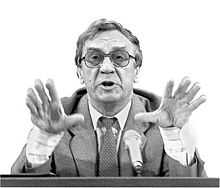President of the Soviet Union
| President of the Soviet Union | |
|---|---|
|
| |
 | |
| Residence | Grand Kremlin Palace |
| Appointer |
Direct election,[1] Congress of People's Deputies[2] |
| Formation | 15 March 1990 |
| First holder | Mikhail Gorbachev |
| Final holder | Mikhail Gorbachev |
| Abolished | 25 December 1991 |
 | ||||||||||||
| This article is part of a series on the politics and government of the Soviet Union | ||||||||||||
|
Leadership |
||||||||||||
|
Governance
|
||||||||||||
|
Judiciary
|
||||||||||||
|
History and politics
|
||||||||||||
|
Society
|
||||||||||||
|
Soviet Union portal | ||||||||||||
The President of the Soviet Union (Russian: Президент Советского Союза, Prezident Sovetskogo Soyuza), officially called President of the USSR (Russian: Президент СССР[1]) or President of the Union of the Soviet Socialist Republics (Russian: Президент Союза Советских Социалистических Республик), was the head of state of the Soviet Union from 15 March 1990 to 25 December 1991. Mikhail Gorbachev was the only person to occupy the office. Gorbachev was also General Secretary of the Communist Party of the Soviet Union between March 1985 and August 1991. He derived an increasingly greater share of his power from his position as president until he finally resigned as General Secretary after the Soviet coup d'état attempt of 1991.
The presidency was an executive post, based on a mixture of the U. S. and French presidencies.
Prior to the creation of the post of president, the de jure head of state of the Soviet Union was the chairman of the Presidium of the Supreme Soviet, who was often called "president" by non-Soviet sources. For most of the Soviet Union's existence, all effective executive political power was in the hands of the General Secretary of the Communist Party of the Soviet Union, with the Chairman of the Presidium exercising largely symbolic and figurehead duties. Starting with Leonid Brezhnev in 1977, the last four General Secretaries—Brezhnev, Yuri Andropov, Konstantin Chernenko and Gorbachev—simultaneously served as de jure head of state during their time in office.
The president was initially elected by the Congress of People's Deputies and served as ex officio chairman of that body, but all future elections were to have been by popular vote. During the election of the president several candidates were nominated, among leading contenders were KGB persona Vadim Bakatin and Premier Nikolai Ryzhkov.
The Vice President of the Soviet Union was Gennady Yanayev, who briefly usurped Gorbachev as president in the 1991 attempted coup as leader of the State Committee of the State of Emergency.
List of Presidents of the Soviet Union
| No. | Portrait | Name (Born–Died) |
Took office | Left office | Political Party |
|---|---|---|---|---|---|
| 1 | .jpg) |
Mikhail Gorbachev (1931-) |
15 March 1990 | 25 December 1991 | Communist |
| – |  |
Gennady Yanayev (usurper) (1937-2010) |
19 August 1991 | 21 August 1991 | Communist |
See also
- Index of Soviet Union-related articles
- List of heads of state of the Soviet Union
- Premier of the Soviet Union
- General Secretary of the Communist Party of the Soviet Union
References
| ||||||||||||||
| ||||||||||||||||||||